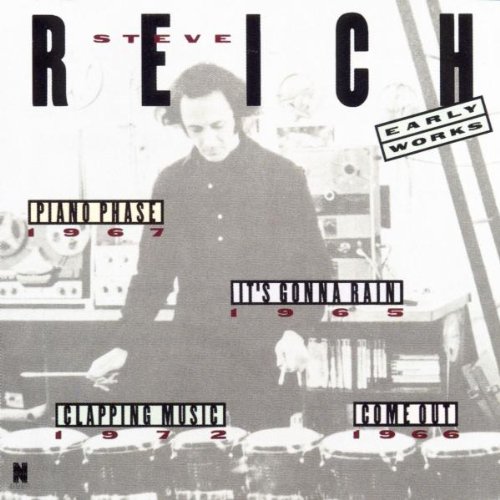8. Steve ReichEarly Works

I could easily talk for several hours just about this. It was particularly this piece called ‘It’s Gonna Rain’ that I heard with my friend Peter Schmidt, the painter. I’d met Peter while I was at art college and he was a very, very distinctive and unusual character. He was a German Jew who’d come over to England in the ’30s and was a very good poker player because it was impossible to know what he was thinking. He was a very inscrutable person. Most people found it very hard to be with him as you’d say something to him and he’d just look at you. But I liked him a lot and we got on very well, and it turned out we’d been thinking about a lot of similar things. One of the things we used to do was sit around at his place in Stockwell and explore new music. Generally it was he who would play things to me and one day he said, "Have you heard this?" and my life changed.
Reich recorded this in ’65, so that’s 51 years old and fucking hell, what have we been doing for half a century? The first thing that happens when you’re listening to that is that the repetitive element of it gradually makes you start to lose focus of the pieces that keep repeating. You start hearing the little differences. It’s a little bit like the way a frog’s eye works. It doesn’t scan like ours do, it stays fixed on a scene and very quickly the rods and cones get saturated with everything that doesn’t move. So as soon as something does move, like a fly, that’s the only thing that the frog sees. I think the ears behave like that when they’re presented with something highly repetitive like this. Your ears quickly saturate or habituate with the common stuff and they start to pick up details. I remember the first time I heard ‘It’s Gonna Rain’, I started to zone in on the pigeons, because this was out in the street, it was a recording of a street preacher so you can hear cars and horns and then you start to hear these birds but only after a while, after the other stuff has cleared out of your consciousness. That’s amazing because what was making the music was my brain and that was the first time I’d realised that, as a composer, you could co-opt a listener’s brain. So suddenly, wow, that’s another 100 per cent of the universe opening up.
When you put something out into the world that is kind of incomplete and it takes your consciousness and the errors of your perceptual mechanism to actually make it into something, that totally changed my idea of what music could be. The actual amount of material used is tiny, the loop of "it’s gonna rain" is not even a second, and that’s the only element used in that section. You think, bloody hell, that’s economy, and I’ve always loved economy. At the time I first heard this we were in a period of maximum indulgence in pop music. Sixteen-track recorders had just appeared so suddenly so many people were just putting so much shit onto everything just because you could. Every spice in the cupboard. Suddenly I heard this and it was so stark and effective. The other thing about it is that within it is a mechanism that I’ve subsequently used a lot, which is the idea of having things running out of sync with each other. Again, your whole experience of music until then had been to do with synchronisation. Everything sticks together and then at this point everything changes together. What happens in this piece is that you get the same cycle but running so that on each repetition they’re in a slightly different place in relation to each other. So you have an automatic generator of variety and I use that on so much of my work. That became my go-to technique for making something interesting straight away.


